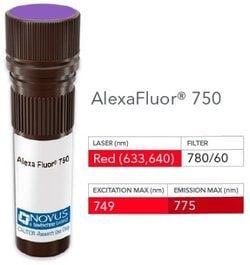EpCAM/TROP1 Antibody (EGP40/1555R), PE/Cy5.5 - (ECD), Novus Biologicals™
Manufacturer: Novus Biologicals
Select a Size
| Pack Size | SKU | Availability | Price |
|---|---|---|---|
| Each of 1 | N254424PEC5-Each-of-1 | In Stock | ₹ 62,878.50 |
N254424PEC5 - Each of 1
In Stock
Quantity
1
Base Price: ₹ 62,878.50
GST (18%): ₹ 11,318.13
Total Price: ₹ 74,196.63
Antigen
EpCAM/TROP1
Classification
Monoclonal
Conjugate
PE-Cyanine5.5
Formulation
PBS with 0.05% Sodium Azide
Gene Symbols
EPCAM
Immunogen
Recombinant full-length human EpCAM/TROP1 protein (Uniprot: P16422 )
Quantity
0.1 mL
Primary or Secondary
Primary
Test Specificity
Recognizes a 40-43kDa transmembrane epithelial glycoprotein, identified as epithelial specific antigen (ESA), or epithelial cellular adhesion molecule (EpCAM). EpCAM is expressed on baso-lateral cell surface in most simple epithelia and a vast majority of carcinomas. This antibody has been used to distinguish adenocarcinoma from pleural mesothelioma and hepatocellular carcinoma. It is also useful in distinguishing serous carcinomas of the ovary from mesothelioma. This epithelial antigen plays an important role as a tumor-cell marker in lymph nodes from patients with esophageal carcinoma otherwise classified as node-negative. Epithelial antigen has also been suggested as a discriminator between basal cell and baso-squamous carcinomas, and squamous cell carcinoma of the skin.
Content And Storage
Store at 4°C in the dark. Do not freeze.
Applications
Flow Cytometry
Clone
EGP40/1555R
Dilution
Flow Cytometry
Gene Alias
17-1A, 323/A3, ACSTD1, antigen identified by monoclonal AUA1, CD326 antigen, Cell surface glycoprotein Trop-1, chromosome 4, surface marker (35kD glycoprotein), DIAR5, EGP, EGP-2, EGP314, EGP40, EpCAM, epithelial cell adhesion molecule, Epithelial cell surface antigen, Epithelial glycoprotein, Epithelial glycoprotein 314, ESA, GA733-2EGP34, hEGP314, HNPCC8, KS 1/4 antigen, KS1/4, KSAHEA125, M1S2, M4S1Ly74, Major gastrointestinal tumor-associated protein GA733-2, MIC18MH99, MOC31, TACST-1, TACSTD1, TROP1CD326, Tumor-associated calcium signal transducer 1CO-17A
Host Species
Rabbit
Purification Method
Protein A purified
Research Discipline
Cancer, Cancer Stem Cells, Tumor Biomarkers
Gene ID (Entrez)
4072.0
Target Species
Human, Mouse (Negative), Rat (Negative)
Isotype
IgG
Description
- EpCAM/TROP1 Monoclonal specifically detects EpCAM/TROP1 in Human, Mouse (Negative), Rat (Negative) samples
- It is validated for Flow Cytometry.


